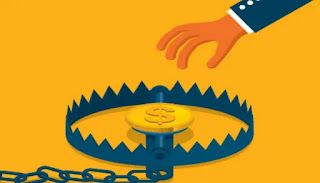Not too long ago, a friend of our family has confined to us that they
were scammed of more than RM 150,000 by someone in the same group. We
didn't know all the details but it makes me thinking of these scams that
are happening almost on daily basis (just that we don't know) and how
we could actually avoid being scammed.
How to know if it is an investment scam?
Clue 1 - Amazing returns
Any investment that promises returns that are greater than what investment markets are able to generate should immediately sound alarm bells. If the investment promises to double or triple your money in a short period of time, runaway as fast as you can.
Clue 2 - Jargon and pressure
Investments that use words such as ‘exclusive offer’, ‘select’, ‘elite’, ‘limited offer’ or ‘opportunity of a lifetime in their marketing material is trying to put pressure on you to give them your money asap. The longer it takes for you to decide, the higher chance that you may not "invest" with them. Thus, they want to get your money and go missing. Knowing this, runaway as fast as you can.
Clue 3 - Private bank account
A legitimate enterprise, it would hold a business account with a reputable financial institution. If the bank account of the investment is held in the name of a private individual, be suspicious. runaway as fast as you can.
Clue 4 - Physical address
The physical address of the organisation should also appear in all their marketing material, including websites and brochures – but don’t take the printing of a physical address at face value. Use Google maps to look up the address and locate the actual building. Many legitimate companies pin their physical locations on Google maps as an added measure of credibility. If it looks weird, runaway as fast as you can.
Clue 5 - Investors recruit more investors
Many multi-level marketing (MLM) schemes and Ponzi schemes operate a business model which requires each ‘investor’ to recruit more ‘investors’ in order to keep the scheme afloat. If the scheme involves any form of recruitment, it is likely to be some form of a pyramid scheme. So, runaway as fast as you can.
Clue 6 - Complex business models
The company should take time to explain their business model to you, including underlying assets and how income will be generated. The business model should be wholly transparent and easy to understand. Investment scams are notorious for their complex business models and technical jargon. If you don’t understand how your money will be used to generate investment returns, runaway as fast as you can.













